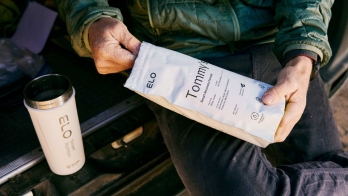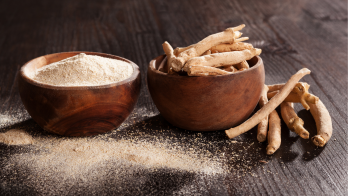5 strategies for sustainable weight loss
Looking to shed some pounds but don’t know where to start? Here are the best strategies for sustainable weight loss, according to science.
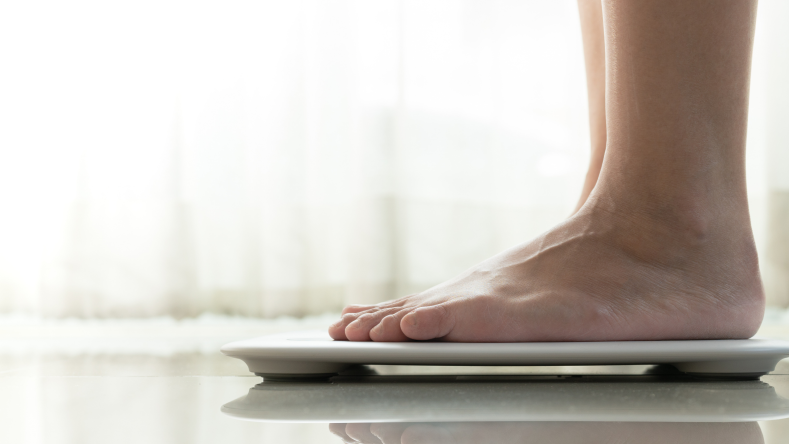
Weight loss is a complicated topic that goes far beyond how many calories you eat. Genetics, nutrition, sleep, stress levels, physical activity, age, ethnicity, socioeconomic status, and medications can all play into shedding pounds. In a world inundated with fad diets, quick fixes, and conflicting advice, it can be hard to distinguish the safe and effective strategies from if you’re looking to drop some pounds.
As tempting as they may sound, quick fixes aren’t the answer if you’re trying to lose weight. If you’re looking to keep the pounds off long-term and maintain a healthy weight, adopting sustainable strategies and prioritizing your long-term health is crucial.
In this article, we are diving into the best science-based strategies for sustainable weight loss. From balanced nutrition tips to personalized weight loss gummies and stress reduction tactics, here’s what science has to say about prioritizing the well-being of both body and mind to achieve a healthier, happier you.
#1: Focus on nutrition.

Get enough protein.
Protein is a macronutrient that has long been praised for its positive effects on athletic performance, muscle soreness, recovery, and satiety. It’s also beneficial for weight loss, as research shows that higher protein intakes during periods of energy restriction can preserve muscle mass and may prevent weight regain after weight loss [ 1
Experts recommend aiming for a daily protein intake of 1.6 - 2.2 g of protein/kg of body weight/day, while athletes can increase this number to 1.8 - 2.7 g/kg/day [ 2 3 4
Interestingly, studies have found that 30-40 g of protein per meal/snack can stimulate muscle protein synthesis and reduce muscle loss with weight loss [ 5 6
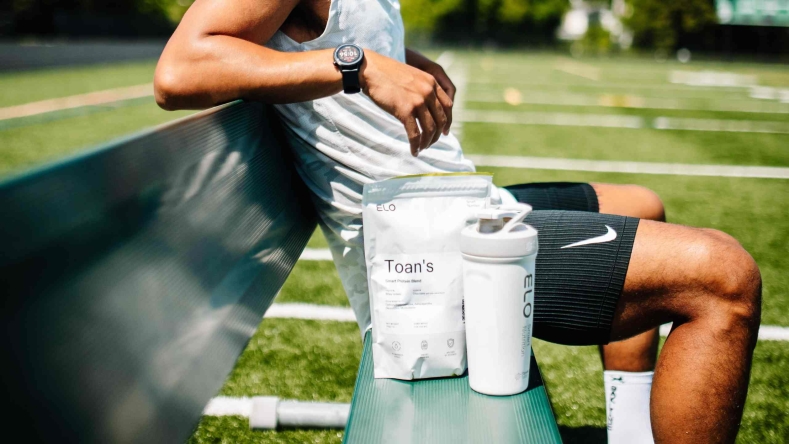
You can meet your protein needs through dietary sources (like lean meats, eggs, peas, Greek yogurt, tofu, and beans) or with protein powder like Elo Smart Protein
Don’t shy away from healthy carbs.
Whether you want to drop a few pounds, maintain your current weight, or optimize your overall health, experts suggest filling up with plenty of fiber-rich, complex carbohydrates. This includes foods like fruits, vegetables, and whole grains, which provide vitamins, minerals, and other compounds (such as fiber) that help with satiety and blood sugar stabilization after a meal [ 7
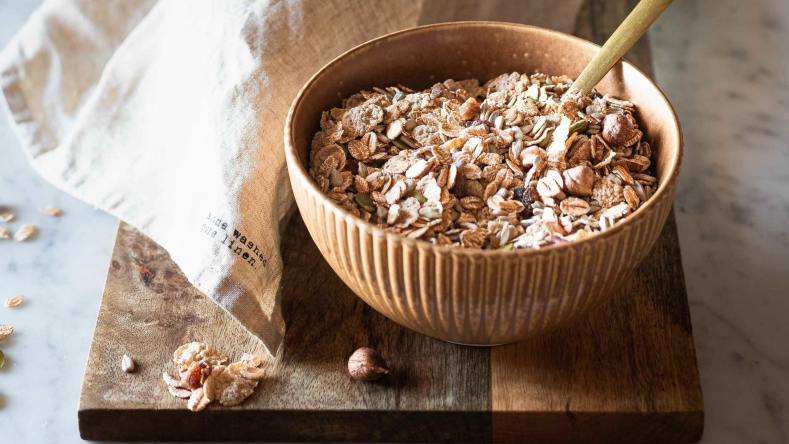
Is oatmeal good for weight loss?
Research shows that oatmeal is good for weight loss, as beta-glucan (a soluble fiber) can help enhance satiety, manage gut microbiota, manage weight, decrease adiposity, and lower glucose levels [ 8 9
Oatmeal is also a good source of fiber, with 1 cup of oats containing 10 g of fiber (roughly 30% of the DV). Experts recommend eating 30-40 g of fiber-rich foods per day for optimal health, digestion, and weight loss [ 10 11

#2: Move your body.
Research shows that regular physical activity has numerous benefits that positively impact longevity, sleep, bone health, cognitive function, chronic diseases, weight management, and weight loss.
The Department of Health and Human Services recommends at least 30 minutes of moderate physical activity/day, 150 minutes of moderate aerobic activity/week, or 75 minutes of vigorous exercise/week for improved health and wellness [ 12
Furthermore, research suggests that 150-250 minutes of moderate-intensity physical activity (such as fast walking, water aerobics, or bike riding) each week will provide modest weight loss, while greater amounts (>250 minutes/week) have been associated with clinically significant weight loss [ 13
Before embarking on a new exercise routine, it’s recommended to see a healthcare provider first.
Is Pilates good for weight loss?
Pilates is an overall body workout that focuses on posture, balance, flexibility, and emphasizes movement, core strength, and resistance. It’s a good option for people who want to avoid putting stress on their joints, since it’s a more joint-friendly workout compared to running or biking. Interestingly, researchers have found that overweight or obese adults who participated in Pilates worked experienced a decrease in body weight, BMI, and body fat percentage compared to those who didn’t do Pilates [ 14
Correlation between exercise, nutrition, and weight loss
Exercise isn’t the only thing to consider if you’re trying to lose weight, as its impact on weight management or weight loss revolves around energy homeostasis. For instance, if you’re looking to lose weight, then the number of calories consumed should be less than the calories burned, and since it takes 3,500 calories (on average) to burn one pound, this means both diet and exercise play important roles in weight loss [ 15
Your energy needs are unique to you and your body, so talk with your healthcare provider to find the right exercise and nutrition combination for you.

#3: Consider taking personalized weight loss gummies.
While supplements are meant to fill dietary gaps and compensate for any nutritional shortfalls, certain ones (like those found in personalized weight loss gummies) may prove beneficial in your weight loss journey.
Enter Elo Smart Gummies: these personalized, 7-layer daily gummy supplements are 3D-printed to match your unique needs based on your health goals, dietary preferences, and biomarkers. Moreover, Elo matches your unique nutrition profile with the latest clinical research to build a custom-made gummy to simplify and streamline your daily supplementation routine.
Here are the specific layers you can get in your Elo Smart Gummies to assist with weight management:
5-HTP
Apple cider vinegar
BPL1® HT
Inositol
LactoSpore® probiotic
White kidney bean extract
Elo Smart Gummies are hyper-personalized, so your specific gummy stack will differ depending on your goals, personal health data, medications, and other facts.
Made with a pectin-based encapsulation formula, Elo Smart Gummies are 100% vegan, allergen-free, Halal- and Kosher-friendly. They have no artificial colors, flavors, added sugars, or preservatives and are third-party tested. Try them out today!
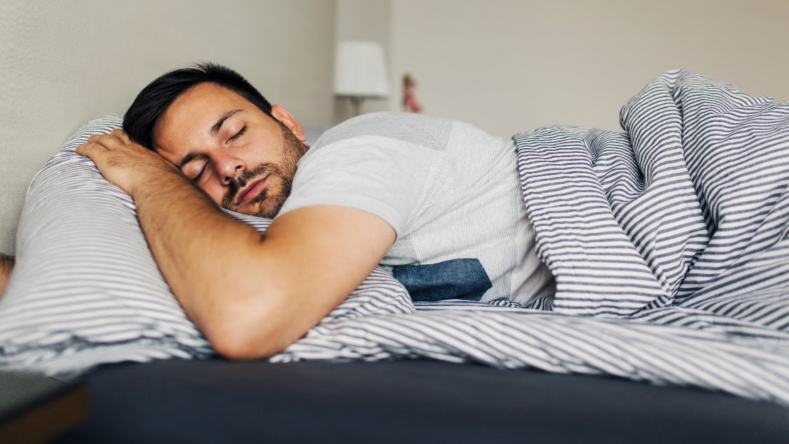
#4: Get more sleep.
Emerging research suggests a correlation between sleep problems and obesity, as the quantity and quality of nightly shut-eye can impact body weight, hormones, and metabolism [ 16 17 18
Furthermore, it’s suggested that short sleep duration may be associated with an increase in ghrelin (the “hunger hormone”) and a decrease in leptin (the “satiating hormone”), which can lead to increased food intake and possible weight gain [ 17
For optimal health and wellbeing, experts recommend getting at least 7-9 hours of quality sleep per night [ 19
Learn more about how to
improve your sleep quality in this article
.

#5: Limit stress.
Research shows that cortisol levels (otherwise known as the “stress hormone”) increase when your body is under chronic stress, which can contribute to numerous health problems, including high blood pressure, sleep issues, brain fog, and a weakened immune system.
Elevated cortisol can also contribute to weight gain, as it may enhance sugar cravings, reduce insulin production, and slow your metabolism [ 20 21
You can combat stress taking certain supplements
Weight loss FAQs
For more information about weight loss, check out these popular articles:
Summary
Weight loss is a complicated topic that goes far beyond how many calories you eat, but one thing is for sure - quick fixes aren’t the answer if you’re trying to lose weight. By adopting sustainable strategies (such as eating a balanced diet, exercising regularly, taking personalized supplements, improving sleep quality, and reducing stress), you can keep the pounds off long -term and maintain a healthy weight.
Disclaimer: The text, images, videos, and other media on this page are provided for informational purposes only and are not intended to treat, diagnose or replace personalized medical care.
Key takeaways
Higher protein intakes during periods of energy restriction can enhance fat-free mass preservation and may prevent weight regain after weight loss.
Regular physical activity has many benefits that positively impact longevity, sleep, bone health, cognitive function, chronic diseases, weight management, and weight loss.
Poor sleep has been shown to negatively impact hormonal rhythms and metabolism, which have been associated with obesity, insulin insensitivity, diabetes, and appetite dysregulation.
Certain supplements (like those found in Elo
personalized weight loss gummies
) may prove beneficial in your weight loss journey.
References
Moon, J., & Koh, G. (2020). Clinical Evidence and Mechanisms of High-Protein Diet-Induced Weight Loss. Journal of obesity & metabolic syndrome, 29(3), 166–173.
https://doi.org/10.7570/jomes20028
Dieter, B. (n.d.). How much protein do you need to eat per day to lose weight?. NASM.
https://blog.nasm.org/nutrition/how-much-protein-should-you-eat-per-day-for-weight-loss
Murphy, C. H., Hector, A. J., & Phillips, S. M. (2014). Considerations for protein intake in managing weight loss in athletes. European Journal of Sport Science, 15(1), 21–28.
https://doi.org/10.1080/17461391.2014.936325
Trexler, E. T., Smith-Ryan, A. E., & Norton, L. E. (2014). Metabolic adaptation to weight loss: Implications for the athlete. Journal of the International Society of Sports Nutrition, 11(1).
https://doi.org/10.1186/1550-2783-11-7
Moore, D. R., Areta, J., Coffey, V. G., Stellingwerff, T., Phillips, S. M., Burke, L. M., Cléroux, M., Godin, J.-P., & Hawley, J. A. (2012). Daytime pattern of post-exercise protein intake affects whole-body protein turnover in resistance-trained males. Nutrition & Metabolism, 9(1), 91.
https://doi.org/10.1186/1743-7075-9-91
Iwao, S., Mori, K., & Sato, Y. Effects of meal frequency on body composition during weight control in boxers. Scandinavian Journal of Medicine & Science in Sports, 6(5), 265–272.
https://doi.org/10.1111/j.1600-0838.1996.tb00469.x
Ioniță-Mîndrican, C. B., Ziani, K., Mititelu, M., Oprea, E., Neacșu, S. M., Moroșan, E., Dumitrescu, D. E., Roșca, A. C., Drăgănescu, D., & Negrei, C. (2022). Therapeutic Benefits and Dietary Restrictions of Fiber Intake: A State of the Art Review. Nutrients, 14(13), 2641.
https://doi.org/10.3390/nu14132641
Shehzad, A., Rabail, R., Munir, S., Jan, H., Fernández-Lázaro, D., & Aadil, R. M. (2023). Impact of Oats on Appetite Hormones and Body Weight Management: A Review. Current nutrition reports, 12(1), 66–82.
https://doi.org/10.1007/s13668-023-00454-3
Mathews, R., Shete, V., & Chu, Y. (2021). The effect of cereal Β‐glucan on body weight and adiposity: A review of efficacy and mechanism of action. Critical Reviews in Food Science and Nutrition, 63(19), 3838–3850.
https://doi.org/10.1080/10408398.2021.1994523
Adding soluble fiber to lower your cholesterol. (n.d.).
https://www.lipid.org/sites/default/files/adding_soluble_fiber_final_0.pdf
Kelly, R. K., Calhoun, J., Hanus, A., Payne-Foster, P., Stout, R., & Sherman, B. W. (2023). Increased dietary fiber is associated with weight loss among Full Plate Living program participants. Frontiers in nutrition, 10, 1110748.
https://doi.org/10.3389/fnut.2023.1110748
Edward R. Laskowski, M. D. (2023, July 26). How much exercise do you really need?. Mayo Clinic.
https://www.mayoclinic.org/healthy-lifestyle/fitness/expert-answers/exercise/faq-20057916
Donnelly, J. E., Blair, S. N., Jakicic, J. M., Manore, M. M., Rankin, J. W., & Smith, B. K. (2009). Appropriate physical activity intervention strategies for weight loss and prevention of weight regain for adults. Medicine & Science in Sports & Exercise, 41(2), 459–471.
https://doi.org/10.1249/mss.0b013e3181949333
Wang, Y., Chen, Z., Wu, Z., Ye, X., & Xu, X. (2021). Pilates for Overweight or Obesity: A Meta-Analysis. Frontiers in physiology, 12, 643455.
https://doi.org/10.3389/fphys.2021.643455
Guth, E. (2014). Healthy weight loss. JAMA, 312(9), 974.
https://doi.org/10.1001/jama.2014.10929
Ding, C., Lim, L. L., Xu, L., & Kong, A. P. S. (2018). Sleep and Obesity. Journal of obesity & metabolic syndrome, 27(1), 4–24.
https://doi.org/10.7570/jomes.2018.27.1.4
Sa, J., Choe, S., Cho, B., Chaput, J.-P., Kim, G., Park, C.-H., Chung, J., Choi, Y., Nelson, B., & Kim, Y. (2020). Relationship between sleep and obesity among U.S. and South Korean College students. BMC Public Health, 20(1).
https://doi.org/10.1186/s12889-020-8182-2
Kim, T. W., Jeong, J. H., & Hong, S. C. (2015). The impact of sleep and circadian disturbance on hormones and metabolism. International journal of endocrinology, 2015, 591729.
https://doi.org/10.1155/2015/591729
Bird, S. P. (2013). Sleep, recovery, and athletic performance. Strength & Conditioning Journal, 35(5), 43–47.
https://doi.org/10.1519/ssc.0b013e3182a62e2f
Kiecolt-Glaser, J. K., Habash, D. L., Fagundes, C. P., Andridge, R., Peng, J., Malarkey, W. B., & Belury, M. A. (2015). Daily stressors, past depression, and metabolic responses to high-fat meals: A novel path to obesity. Biological Psychiatry, 77(7), 653–660.
https://doi.org/10.1016/j.biopsych.2014.05.018
Geiker, N. R., Astrup, A., Hjorth, M. F., Sjödin, A., Pijls, L., & Markus, C. R. (2017). Does stress influence sleep patterns, food intake, weight gain, abdominal obesity and weight loss interventions and vice versa? Obesity Reviews, 19(1), 81–97.
https://doi.org/10.1111/obr.12603



